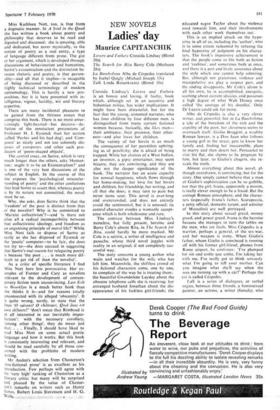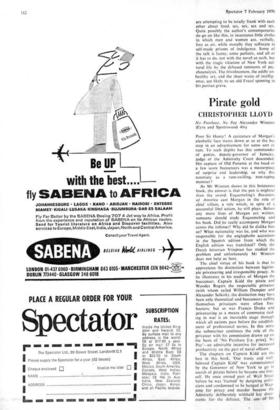NEW NOVELS
Ladies' day
Maurice CAPITANCHIK
Lovers and Fathers Cressida Lindsay (Blond 30s) The Search for Rita Barry Cole (Methuen 28s) La Bambolona Alba de Cespedes translated by Isabel Quigly (Michael Joseph 35s) Talk Linda Rosenkrantz (Blond 30s) Cressida Lindsay's Lovers and Fathers is an honest and loving, if faulty, book which, although set in an eccentric and bohemian milieu, has wider implications. It might have been distasteful, but for the fact that the young, unnamed narrator, who has four children by four different men, is distinguished from many current fictional women because, basically, she likes men— their ambiance, their presence, their other- ness—and also loves her children.
The variety of her lovers is as much the consequence of her parentless upbring- ing as of proclivity; she is afraid of being trapped. While her choices of a West Indian, an inventor, a gipsy entertainer, may seem bizarre, they are convincing, and they are also not the deeper significance of the book. The narrator has an acute capacity for sensual happiness, which flows through her home-making, her love for her lovers and children, her friendship, her writing, and all that she does; it may turn to pain but never turns sour. This novel is over-long and overcrowded, and does not entirely avoid the sentimental, but it is unusual; its central character exudes a womanly accept- ance which is both wholesome and rare.
The contrast between Miss Lindsay's nameless, but fully present, heroine and Barry Cole's absent Rita, in The Search for Rita, could hardly be more marked. Mr Cole is a satirist, a writer of intelligence and panache, whose third novel juggles with reality in an original, if not completely suc- cessful way.
The story concerns a young author who waits and watches for the wife who has left him. Meanwhile, the shiftless crowd of his fictional characters come, one by one, to complain of the way he is treating them: the beautiful Gwendolene Layday about the obscene telephone calls she is receiving; her estranged husband Jonathan about the dis- appearance of his feckless girl-friends; the educated negro Taylor about the violence used towards him, and their involvements with each other work themselves out.
This is an implied attack on the hypo- crisy in all of us, including the 'author', who is to some extent redeemed by refusing the final hypocrisy of judgment on his charac- ters. The book's impressive achievement is that the people come to life both as fiction and 'realities', and sometimes both at once, and there is a pert and lively assurance about the style which one cannot help admiring. But, although not gratuitous, violence and manipulative sex play a suspect part, and the ending disappoints. Mr Cole's idiom is all his own, he is accomplished, energetic, scathing about current idiocies, and possesses a high degree of what Walt Disney once called 'the courage of his doodles'. Only Dr Leavis could ask for more.
Alba de C6spedes is also a very clever writer, and powerful, but in La Bambolona, a tale of the boredom of the rich and the cupidity of the poor, her cleverness seems to overreach itself. Giulio Broggini, a wealthy Roman lawyer, is a Don Juan who follows a young girl in the street. gets to know her family and, finding her inaccessible, plans to marry and then desert her. Persuaded to visit his flat, she claims to be pregnant by him, but later, to Giulio's chagrin, she re- veals the truth.
Almost everything about this novel, al- though overdrawn, is convincing, but for the story. One simply cannot believe that a man of Giulio's sophistication can be so gullible, nor that the girl, Ivana, apparently a moron, is really clever enough to be a fraud. But the corrupt Roman atmosphere, and the charac- ters (especially Ivana's father, Scarapeccia, a petty official, domestic tyrant, and admirer of Mussolini) are well portrayed.
In this story about sexual greed, money greed, and power greed, Ivana is the heroine because she manages to turn the tables on the men, who are fools. Miss Cespedes is a warrior, perhaps a general, of the sex-war, and her weapon is irony. When Giulio's father, whom Giulio is convinced is running off with his former girl-friend, phones from Rome airport, he confesses: 'I've plumped for sin and coOte que coute, I'm taking her with me. I've really got to think seriously what I'm going to tell your mother. Can you imagine what she'll say when she sees me turning up with a cat?' Perhaps the cat is called Cespedes.
Talk is a series of dialogues, or verbal orgies, between three friends, a homosexual painter, an actress, a writer (female), who are attempting to be totally frank with each other about food, sex, sex, sex and sex. Quite possibly the author's contemporaries do go on like this, in incestuous little circles in which men and women are, verbally, free as air, while morally they suffocate in self-made prisons of indulgence. Some of the talk is funny, some pathetic, and all of it has to do, not with the novel as such, but with the tragic vitiation of NeW York cul- tural life by the debased remnants of psy- choanalysis. The frivolousness, the oddly un- healthy sex, and the sheer waste of intellig- ence, are likely to set old Freud spinning in - his puritan grave.



































 Previous page
Previous page